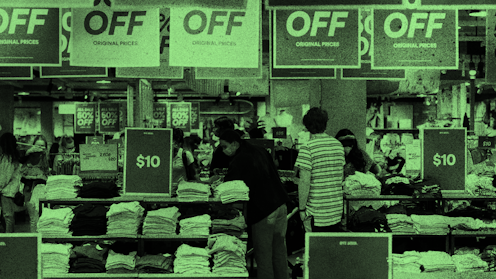How can you be sure your clothing has been produced ethically?
- Written by The Conversation

Today’s consumers are swimming in a sea of information. Products are marketed with big, bold words such as “sustainable”, “ethical” and “organic”. They sound good, they catch our attention, and they make us feel better about what we buy.
The reality is, in today’s market, figuring out which claims are true is no easy task.
One big reason is greenwashing, when brands use these buzzwords to sell products without living up to what the words actually mean. In fashion especially, these terms are thrown around so often that their meaning has been watered down. Instead of being about genuine change, they are often just a sales tool.
So, how can you know what to look out for?
Who should take responsibility for green claims?
Greenwashing takes many forms. Sometimes brands know they are misleading; this is direct greenwashing. Other times, it’s indirect, when brands simply do not know the full story of their own supply chains. A T-shirt, for example, might start as raw cotton in one country, get processed into fabric in another, sewn into a garment, and then shipped overseas for sale.
At each stage, there are different suppliers, factories and workers. The brand has limited visibility over what happens in these tiers. When a brand claims it produces ethically, but does not, that is greenwashing. If it involves exploitation or forced labour, it then becomes modern slavery, turning greenwashing into something more dangerous.
This raises a big question: who is responsible? The obvious answer is the brands. They design, order, and sell the products, and they profit from them. Consumers are paying for these goods, so they should have access to credible information, not just vague claims or nice-sounding labels.
The fashion industry is constantly in the spotlight for problems in its supply chains. Stories about poor working conditions, environmental damage, and lack of transparency pop up all the time. But just like a viral trend on social media, the attention often fades quickly, and people move on to the next story.
Certifications aren’t perfect
There are many certifications in the fashion industry trying to help, but they are not foolproof. A label might promise ethical sourcing, but that does not guarantee transparency or prove that every step was ethical.
A large portion of China’s cotton comes from the Xinjiang region, which has long been linked to forced labour; concerns were highlighted in a United Nations report in 2022. Another example is deforestation in Brazil, where cotton from affected areas was certified under the “Better Cotton” scheme. Many major brands – like ASICS producing the Australian Olympic uniforms – have faced scrutiny for sourcing cotton from controversial regions.
Tracing global supply chains is hard. But the responsibility does not disappear just because it’s complicated.
In Australia, the Modern Slavery Act took effect in January 2019 to tackle issues such as forced labour and exploitation. Penalties include heavy fines or jail time.
However, there is a major loophole, as only companies with an annual revenue over A$100 million are required to report under the act. For big corporations, even if they are caught, the penalty can be tiny compared to the profits they have made.
This is not just an Australian problem, it’s global. For example, luxury brand Dior was placed under judicial administration after being found negligent for failing to act against worker exploitation in its subcontracted supply chain in Italy. The pattern is often the same; a company gets accused, sometimes even fined, but the cost is minimal compared to their annual revenue, so it’s barely a setback.
Is there a role for government?
So, should the responsibility rest only with brands? Not entirely. Governments also benefit from these companies through taxes and trade. They profit indirectly when the companies profit, and they benefit from the jobs these companies provide.
A stronger approach would involve government bodies and brands working with supply chain mapping companies, such as Textile Genesis, TrusTrace or FibreTrace. These platforms, often powered by blockchain and artificial intelligence, track a product through every stage of production.
Blockchain – which uses a decentralised database – can be a game changer.
Unlike websites or paper trails, blockchain data cannot be altered without leaving trace. Once recorded, the information is permanent, and it can be shared across manufacturers, brands and government bodies to maintain real-time disclosure.
When products enter a country, the ethical claims behind them could be verified in real time, instead of relying on brands to respond after an allegation is made.
The upfront cost is high and adoption might be slow. But in the long run it could save money on compliance, audits and damage control, while also building consumer trust.
Brands would still make profits, but consumers would have the confidence the products they are buying live up to the claims. Instead of government agencies being passive players, they would actively enforce that products meet the standards consumers expect.
In short, brands need to be held accountable, but so do governments. Greenwashing, modern slavery, and unethical sourcing will keep slipping through the cracks, unless they both work together.
The tools to make the fashion industry more transparent and honest already exist; it’s just a matter of using them.
Read more https://theconversation.com/how-can-you-be-sure-your-clothing-has-been-produced-ethically-262800







